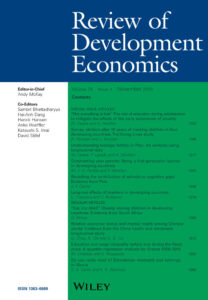Survey attrition after 15 years of tracking children in four developing countries: The Young Lives study
| Year | : | 2020 |
|---|---|---|
| Author/s | : | Alan Sanchez, Javier Escobal |
| Area/s | : | Methodologies for research and evaluation of policy and programmes |
Sánchez, A. y Escobal, J. (2020). Survey attrition after 15 years of tracking children in four developing countries: The Young Lives study. Review of Development Economics, 24(4), 1196-1216. https://doi.org/10.1111/rode.12660
Young Lives (YL) is a multicountry, birth cohort study that, over a period of 15 years, followed nearly 8,000 individuals born in 2001–2002 and 4,000 individuals born in 1994–1995 in Ethiopia, India (states of Andhra Pradesh and Telangana), Peru, and Vietnam. This study aims to document attrition in the YL samples, to identify the correlates of attrition, and to test for attrition bias. The cumulative year-to-year attrition rate is 0.5% and 0.8% for the younger and older cohorts, respectively, among the lowest attrition rates in longitudinal studies in low- and middle-income countries. Attrition rates vary by household wealth, area of residence, and ethnicity/caste across countries. Attrited individuals in Peru are poor and those in other countries are wealthier. When analyzing a set of nutritional and cognitive outcomes, suggestive evidence of attrition bias exists, part of which is driven by child mortality. Even though attrition is very low, our findings highlight the importance of controlling for household socioeconomic characteristics when performing statistical analysis of the YL samples. The study also highlights key insights that can be helpful to reduce attrition or ameliorate its effects in other longitudinal studies.







